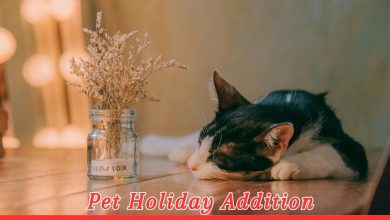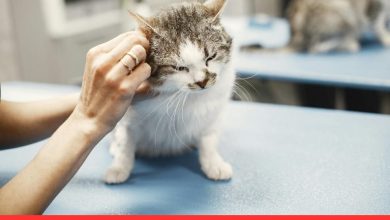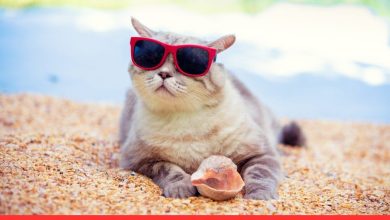Old Cat Behavior: Tips to Keep Your Senior Feline Happy


Hey there, cat lovers! As our beloved furballs grow older, it’s only natural to notice some changes in their behavior.
Just like humans, cats age, and their needs change too.
In this blog post, we’re going to dive into the world of old cat behavior, exploring the signs of aging in our feline friends and how to ensure they stay happy and healthy as they grow older.
So, grab a cup of tea, curl up with your kitty, and let’s unravel the secrets of senior cat behavior.
What are the signs of an aging cat?
As our cats age, their bodies and behaviors undergo transformations. It’s essential to be aware of these changes to provide the best care.
Some common signs of an aging cat include:
- Decreased energy: Older cats tend to be less active and sleep more.
- Weight changes: They might gain or lose weight, so monitoring their diet is crucial.
- Dental issues: Dental problems can become more common in senior cats.
- Arthritis: Stiff joints and reduced mobility can be indicators of aging.
- Changes in fur: Senior cats may have duller, thinning fur.
- Reduced senses: Hearing and vision may deteriorate with age.

Why does cat behavior change with age?
Just like us, cats experience physical and mental changes as they get older.
It’s important to understand that these shifts in behavior are not something your kitty can control. They’re part of the natural aging process.
Factors contributing to changes in cat behavior with age include:
Physical health
One of the most significant influencers of changing cat behavior as they age is their physical health.
Older cats are more prone to various ailments, such as arthritis and dental issues.
Arthritis can be particularly challenging for cats, leading to stiffness, discomfort, and reduced mobility.
This can result in a decrease in their inclination to engage in playful activities and may even affect their ability to use the litter box comfortably.
Mental health
Cognitive decline, similar to dementia in humans, is another reason for behavioral changes in aging cats.
This decline can manifest as confusion, disorientation, and forgetfulness.
Your cat may no longer remember where their food bowl is or may have trouble recognizing familiar people or surroundings.
They may exhibit signs of anxiety or restlessness, becoming easily agitated or displaying unusual behaviors.
Patience and understanding are crucial when dealing with a cat experiencing cognitive decline.
Sensory changes
Cats, like humans, can experience deterioration in their senses as they age.
Their sense of sight and hearing may become impaired.
Diminished vision can lead to difficulties in perceiving objects or judging distances accurately, which can make them hesitant to jump or play as they once did.
Reduced hearing can affect their perception of the world around them, making them more easily startled or less responsive to your calls.

Common Behavioral Changes in Older Cats
Let’s delve into common behavioral changes in older cats in more detail.
These changes can be quite typical as feline companions age, and understanding them is essential for providing the best care.
Altered sleep patterns
One noticeable change in senior cats is their sleep patterns.
They tend to snooze more frequently, often throughout the day and night.
This increase in sleep is generally a result of the natural aging process.
However, it can sometimes be challenging to differentiate between normal age-related behavior and a potential health issue.
Restlessness during sleep, such as pacing or night-time vocalization, can be a sign of discomfort or other underlying problems.
Increased vocalization
Senior cats often become more vocal, and this can be attributed to a variety of factors.
Confusion is one common reason; they may meow because they are disoriented or anxious.
Discomfort due to medical issues, like arthritis, dental problems, or kidney disease, can also prompt increased vocalization.
While it’s important to pay attention to your cat’s vocalizations, it’s equally crucial to consult with your vet to rule out any underlying health concerns that may be contributing to this behavior.
Litter box issues
Changes in bathroom habits can be a significant concern in older cats.
Senior cats may experience physical discomfort, such as arthritis, that makes it painful to climb into the litter box.
Cognitive changes, including memory problems, can lead to your cat forgetting the location of the litter box or the proper use of it.
Sometimes, issues like kidney disease can increase the frequency of urination, leading to litter box accidents.
Appetite changes
In the world of older cats, a waning appetite is a familiar sight.
They might develop a discerning palate, becoming more selective about their food choices, or they may simply eat less than in their younger, more voracious days.
This reduction in appetite can be ascribed to a medley of factors, including dental woes, shifts in taste and smell sensitivity, and the lurking presence of underlying medical conditions.
It’s paramount to seek guidance from your trusty veterinarian to tackle these issues head-on and ensure your feline companion receives the care and nutrition they need.
Aggression or irritability
Just like the aging process affects humans, it can lead cats down a path of decreased patience and heightened irritability.
This temperament shift may be instigated by a host of factors, such as physical discomfort or cognitive changes.
Conditions like arthritis can usher in pain and discomfort, rendering a cat more susceptible to irritability.
Cognitive alterations, like feline dementia, can also contribute to shifts in behavior.
Older cats may experience moments of confusion or disorientation, which can translate into frustration and, at times, even spurts of aggression.
Reduced vision and hearing
As cats gracefully age, their senses of sight and hearing may undergo a gradual decline.
This diminishing vision might lead to episodes of clumsiness and challenges in perceiving objects in their environment.
Such experiences can heighten their anxiety levels and make them more susceptible to sudden startles.
Simultaneously, reduced hearing can impact their responsiveness to cues and alter their perception of the world that surrounds them.
Adapting their environment and providing additional support and reassurance can go a long way in ensuring their continued well-being.
Weight loss or gain
Changes in weight are common in older cats.
Weight loss can occur due to various factors, including dental problems, digestive issues, or underlying medical conditions like hyperthyroidism or kidney disease.
On the other hand, weight gain may result from decreased activity levels and a slower metabolism.
Monitoring your cat’s weight and consulting with a veterinarian is crucial to ensure they maintain a healthy body condition.
Decreased activity levels
It’s natural for older cats to become less active than their younger counterparts.
They might not jump or play as vigorously as they once did.
Arthritis and joint pain can make movement uncomfortable, contributing to decreased activity levels.
Providing soft and comfortable resting places and encouraging gentle exercise can help alleviate some of these issues and maintain your cat’s physical well-being.
Changes in sleep patterns
Changes in sleep patterns are also common in senior cats.
They may sleep more during the day and night, and sometimes restlessness during sleep can occur.
This might be due to discomfort or cognitive changes.
It’s essential to provide a comfortable and cozy sleeping environment and ensure your cat has easy access to their resting spots.
Monitoring these sleep patterns can help identify any potential issues or discomfort that need to be addressed.

How to help your aging cat?
Caring for an aging cat requires patience and understanding. Here are some tips to ensure your senior feline friend remains content:
Regular vet check-ups
It’s crucial to schedule regular check-ups with your veterinarian.
Senior cats are more susceptible to various health issues, and early detection is key to effective treatment.
These check-ups typically include dental assessments, blood work, and discussions about any behavioral changes you’ve noticed.
Your vet can provide guidance on managing age-related concerns and help you maintain your cat’s quality of life.
Adapt the environment
As your cat ages, you may need to make your home more senior-friendly.
Provide easy access to essential areas like food, water, and litter boxes.
Cats with arthritis or joint issues may have trouble climbing into high-sided litter boxes or accessing their favorite resting spots, so consider providing ramps or lower entry options to make their life easier.
Dietary adjustments
Consider transitioning your senior cat to specialized senior cat food.
These formulas are designed to meet their changing nutritional needs.
They often contain reduced calories to help maintain a healthy weight, as older cats are more prone to weight gain.
Discuss dietary changes with your vet to ensure you’re meeting your cat’s specific requirements.
Gentle exercise
While senior cats may not be as active as they once were, they still benefit from light play and exercise.
Engage your cat in gentle activities that help with weight management and muscle strength.
Interactive toys and laser pointers can be great for encouraging movement without overexertion.
Regular but low-impact playtime can keep your cat mentally and physically stimulated.

Comfort and warmth
Senior cats appreciate comfortable and warm resting spots.
Cats tend to feel the cold more as they age, so consider providing heated cat beds or placing their favorite sleeping spots near radiators or other sources of warmth.
Soft blankets and cozy hideaways are also excellent options to help your cat stay comfortable.
Medication and supplements
Some senior cats may require medications or supplements for specific health issues.
Consult with your vet to determine if your cat needs any additional support.
Medications for pain management, joint health, or specific health conditions can significantly improve their comfort and quality of life.
Keep active and engaged
Aging doesn’t mean your cat loses interest in the world.
Keep them engaged with toys, puzzles, and interactive games.
Mental stimulation is essential for their cognitive health, helping to stave off boredom and potential behavioral issues.
Feed a high-quality diet
Senior cats need a high-quality diet that meets their specific needs.
Look for cat foods formulated for seniors that take into account their lower energy requirements, potential dental issues, and other age-related concerns.
Adequate hydration is also essential, so consider wet food to help with water intake.
Conclusion
As our cats age, the adjustments we make in their care routines are a testament to the love and commitment we have for our furry family members.
Understanding their needs and behavior changes, coupled with regular veterinary care and a senior-friendly environment, ensures they continue to bring us joy and live out their golden years in comfort and contentment.
FAQs
Cats are typically considered seniors around 7-10 years of age, but this can vary by breed.
Watch for signs like changes in appetite, grooming habits, and mobility. If you suspect pain, consult your vet.
Regular vet check-ups, a balanced diet, and keeping your cat active are essential for maintaining their health.
Yes, there are special senior cat foods formulated to meet the nutritional needs of older cats.
Interactive toys, puzzle feeders, and spending quality time with your cat can help keep their minds active and engaged.



